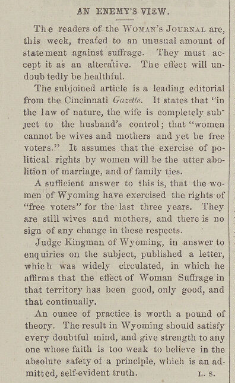Making History: Four Ways to Celebrate 150 Years of Women in the Law
Join Wisconsin’s legal community in celebrating 150 years of women in the law. Here are four ways that you, your law firm, or local legal community can recognize the significant contributions women have made to Wisconsin’s legal history.
Governor Proclaims June 17 as Wisconsin Women Lawyers Day
To commemorate the 150th anniversary of Lavinia Goodell becoming Wisconsin’s first woman lawyer, Gov. Tony Evers has proclaimed June 17, 2024, as Wisconsin Women Lawyers Day.
The proclamation praises Goodell for pioneering a path for women in the legal profession across the state and for facing the many obstacles thrown in her path with unwavering resilience. It recognizes the lasting impact of women lawyers on the fabric of the state’s legal system and emphasizes the importance of continuing to support and promote the advancement of women in the legal profession.
“In the spirit of this proclamation, we invite the legal community to share their own histories and stories of the women within their law firms, offices, or law-related organizations with the public, clients, and local media,” suggests Mary E. Burke. Burke and a consortium of women lawyers, including representatives of the Association for Women Lawyers, the Legal Association for Women, and the Women Lawyers of the North, are planning a variety of activities in 2024 to celebrate this historical event.
Commemorating Goodell’s Admission: June 17 in Janesville
To further celebrate this historical milestone, this consortium of women lawyers is hosting a commemoration of Lavinia Goodell’s admission on Monday, June 17, 2024, which is the anniversary of her admission in Rock County.
Everyone is invited to attend the program at 5 p.m. in the Rock County Courthouse, 51 S. Main St., Janesville. A reception will follow at the nearby Genisa Wine Bar, 11 N. Main St., Janesville (cash bar). There is no cost for the program or reception, but RSVPs are requested for planning purposes. Send replies to wiswomenlaw150@gmail.com.
Exploring Legal Developments Affecting Women: June 20 in Green Bay
The State Bar of Wisconsin’s Annual Meeting & Conference in Green Bay will include a special continuing legal education program exploring some important Wisconsin legal developments affecting women and the women lawyers who advanced them. The program, at 3:15 pm on Thursday, June 20, will begin with a welcome by Wisconsin Supreme Court Justice Ann Walsh Bradley. Topics covered will include:
- Lavinia Goodell and the right to practice law;
- Equal pay for equal work;
- Married women’s right to own property and have credit;
- Indigenous women’s legal identity, jurisdiction, and missing and murdered indigenous women; and
- Women as legal peacemakers: collaborative divorce, mediation, and restorative justice
Reenacting Goodell’s Admission: Aug. 8 at Old World Wisconsin
Old World Foundation will host a program celebrating the 150th anniversary of Lavinia Goodell’s admission to practice law in Wisconsin. This program will take place at Old World Wisconsin in Eagle at 11 a.m. and 1:30 p.m. on Thursday, Aug. 8, during their “Kids Get in Free” week.
“Old World Wisconsin is Wisconsin’s premier living history attraction that shares the stories of the past through hands-on activities,” says Gwen Griffin, executive director of Old World Foundation. “Thus, this reenactment is the perfect program to bring to the site.”
The reenactment is especially exciting because this year our foundation is also celebrating the 40-year fundraising partnership with Old World Wisconsin, says Griffin.
To Learn More
To learn more about the celebration of 150 years of women in the law, contact Mary E. Burke at WisWomenLaw150@gmail.com.
To learn more about the programming offered at Old World Wisconsin and to purchase tickets for the Aug. 8 event, visit oldworldwisconsin.org.
For information about Old World Foundation and how it supports Old World Wisconsin, visit oldworldfoundation.org.











